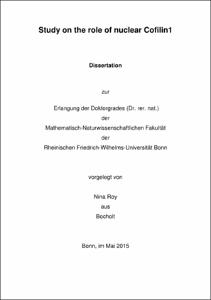Roy, Nina: Study on the role of nuclear Cofilin1. - Bonn, 2016. - Dissertation, Rheinische Friedrich-Wilhelms-Universität Bonn.
Online-Ausgabe in bonndoc: https://nbn-resolving.org/urn:nbn:de:hbz:5n-43411
Online-Ausgabe in bonndoc: https://nbn-resolving.org/urn:nbn:de:hbz:5n-43411
@phdthesis{handle:20.500.11811/6754,
urn: https://nbn-resolving.org/urn:nbn:de:hbz:5n-43411,
author = {{Nina Roy}},
title = {Study on the role of nuclear Cofilin1},
school = {Rheinische Friedrich-Wilhelms-Universität Bonn},
year = 2016,
month = jun,
note = {Cofilin1, an actin depolymerizing factor, is a member of the ADF/Cofilin family. The ADF/Cofilin family members carry a conserved nuclear translocation signal (NTS) comprising the core amino acid sequence KKRKK. In vitro studies showed wt-Cofilin1 in the cytoplasm and the nucleus, whereas Cofilin1 NTS mutants were restricted to the cytoplasm. In this thesis the physiological consequences of a mutation of the NTS to KTRTK were studied with the help of a mouse line. Even though Cofilin2, ADF and Cofilin1 share similar biochemical properties, they differ in regulation and expression pattern and are not functionally identical.
Cofilin1KTRTK/KTRTK mutants were not born but viable until the time of birth. Homozygous KTRTK-Cofilin1 mutants showed an exencephalic phenotype, a cranial neural tube closure defect, apparent at embryonic day 10 (E10). Massive malformations of brain structures, seemingly a defect in the midbrain and diencephalon development, resulting in characteristics of an everted brain were observed. In vitro neurons displayed increased branching activity and astrocytes indicated a delay in maturation. Analysis of mouse embryonic fibroblasts (Mefs) derived from Cofilin1KTRTK/KTRTK embryos revealed distinct disturbances in the progression of the G2/M phase of the cell cycle, significantly reduced proliferation rates and morphological differences in the form of multinucleate cells and increase in cell size as well. FACS analyses observed changes in G- and F-actin ratios in Cofilin1KTRTK/KTRTK mutant cells. This could be responsible for cytokinesis and growth defects in Mefs and aberrant brain development. Actin assays showed reduced depolymerizing activity of KTRTK-Cofilin1, confirming that KTRTK-Cofilin1 was not fully functional. Protein level analysis revealed the decrease of KTRTK-Cofilin1 during embryonic development. Decrease did not result from transcriptional modifications, changed protein stability or altered solubility. Microarray data showed alterations in gene expression of extracellular matrix proteins and actin isoforms for instance. Acquired data indicates that the subcellular location of Cofilin1 is essential for maintenance of the cell homeostasis. Nucleo- cytoplasmic shuffling of actin, makes Cofilin1 a critical regulator of transcriptional activity.
Multiple proof experiments lead to the solid conclusion that Cofilin1 is connected to disparate and highly complex events for embryonic development, morphogenesis and cellular functionality.},
url = {https://hdl.handle.net/20.500.11811/6754}
}
urn: https://nbn-resolving.org/urn:nbn:de:hbz:5n-43411,
author = {{Nina Roy}},
title = {Study on the role of nuclear Cofilin1},
school = {Rheinische Friedrich-Wilhelms-Universität Bonn},
year = 2016,
month = jun,
note = {Cofilin1, an actin depolymerizing factor, is a member of the ADF/Cofilin family. The ADF/Cofilin family members carry a conserved nuclear translocation signal (NTS) comprising the core amino acid sequence KKRKK. In vitro studies showed wt-Cofilin1 in the cytoplasm and the nucleus, whereas Cofilin1 NTS mutants were restricted to the cytoplasm. In this thesis the physiological consequences of a mutation of the NTS to KTRTK were studied with the help of a mouse line. Even though Cofilin2, ADF and Cofilin1 share similar biochemical properties, they differ in regulation and expression pattern and are not functionally identical.
Cofilin1KTRTK/KTRTK mutants were not born but viable until the time of birth. Homozygous KTRTK-Cofilin1 mutants showed an exencephalic phenotype, a cranial neural tube closure defect, apparent at embryonic day 10 (E10). Massive malformations of brain structures, seemingly a defect in the midbrain and diencephalon development, resulting in characteristics of an everted brain were observed. In vitro neurons displayed increased branching activity and astrocytes indicated a delay in maturation. Analysis of mouse embryonic fibroblasts (Mefs) derived from Cofilin1KTRTK/KTRTK embryos revealed distinct disturbances in the progression of the G2/M phase of the cell cycle, significantly reduced proliferation rates and morphological differences in the form of multinucleate cells and increase in cell size as well. FACS analyses observed changes in G- and F-actin ratios in Cofilin1KTRTK/KTRTK mutant cells. This could be responsible for cytokinesis and growth defects in Mefs and aberrant brain development. Actin assays showed reduced depolymerizing activity of KTRTK-Cofilin1, confirming that KTRTK-Cofilin1 was not fully functional. Protein level analysis revealed the decrease of KTRTK-Cofilin1 during embryonic development. Decrease did not result from transcriptional modifications, changed protein stability or altered solubility. Microarray data showed alterations in gene expression of extracellular matrix proteins and actin isoforms for instance. Acquired data indicates that the subcellular location of Cofilin1 is essential for maintenance of the cell homeostasis. Nucleo- cytoplasmic shuffling of actin, makes Cofilin1 a critical regulator of transcriptional activity.
Multiple proof experiments lead to the solid conclusion that Cofilin1 is connected to disparate and highly complex events for embryonic development, morphogenesis and cellular functionality.},
url = {https://hdl.handle.net/20.500.11811/6754}
}






